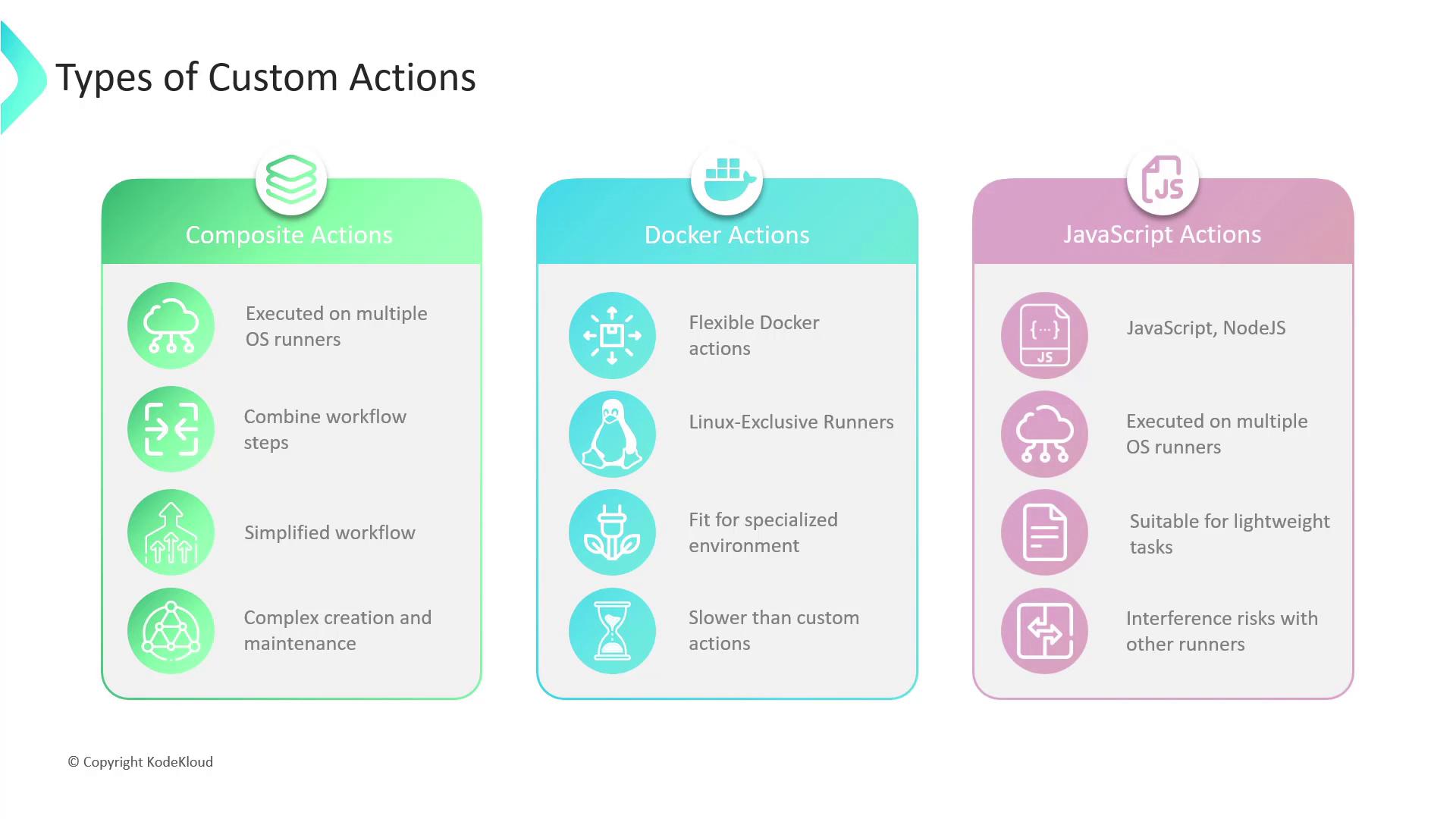GitHub Actions Certification
Custom Actions
What are Custom Actions
Custom GitHub Actions empower you to tailor your CI/CD pipelines to meet project-specific requirements. While the GitHub Marketplace offers a wealth of community-maintained Actions—covering tasks like runtime setup, artifact transfer, Docker builds, test report syncing, and Kubernetes deployments—there are scenarios where you need:
- Project-specific logic not covered by existing Actions
- Integration with internal or legacy services
- Complex orchestration with conditional steps or custom dependencies
- Strict compliance or security policies requiring in-house solutions
Note
Leverage community Actions whenever possible to reduce maintenance overhead. Create a custom Action only when you need functionality that isn’t already available.
Common use cases include:
- Publishing an npm package when a new Git tag is created
- Sending SMS or Slack alerts upon critical issue creation
- Deploying custom security policies or infrastructure templates
GitHub supports three main Action types. You can compare their features below:

| Action Type | Runner Support | Isolation | Best For |
|---|---|---|---|
| Composite Actions | Linux, macOS, Windows | Low (host) | Bundling repeated workflow steps |
| Docker Container | Linux only | High (container) | Complex environment or OS dependencies |
| JavaScript Actions | Linux, macOS, Windows | Medium | Fast, lightweight scripting tasks |
Composite Actions
Composite Actions let you encapsulate multiple workflow steps into a single reusable unit.
# .github/actions/my-composite/action.yml
name: "My Composite Action"
description: "Install deps, run tests, and lint code"
runs:
using: composite
steps:
- name: Checkout code
uses: actions/checkout@v3
- name: Install dependencies
run: npm ci
- name: Run tests
run: npm test
- Pros: Simplifies workflows, DRY principle, cross-platform
- Cons: Can become hard to maintain if too many steps are bundled
Docker Container Actions
Container Actions run inside a Docker environment defined by you.
# .github/actions/my-docker/Dockerfile
FROM node:16
RUN npm install -g aws-cli
COPY entrypoint.sh /entrypoint.sh
ENTRYPOINT ["/entrypoint.sh"]
# .github/actions/my-docker/action.yml
name: "My Docker Action"
runs:
using: docker
image: Dockerfile
args:
- "--region"
- "us-east-1"
- Pros: Full OS control, consistent environment, ideal for complex dependencies
- Cons: Linux only, requires Docker knowledge, startup overhead
Warning
Docker container Actions run exclusively on Linux runners. Make sure your workflow requirements align with Linux-only execution.
JavaScript Actions
JavaScript Actions execute directly on the runner via Node.js.
// .github/actions/my-js-action/index.js
import core from "@actions/core";
async function run() {
try {
const name = core.getInput("name");
core.info(`Hello, ${name}!`);
} catch (error) {
core.setFailed(error.message);
}
}
run();
# .github/actions/my-js-action/action.yml
name: "My JS Action"
runs:
using: "node16"
main: "index.js"
inputs:
name:
description: "Your name"
required: true
- Pros: Fast startup, cross-platform, simple scripting
- Cons: Less isolated—be mindful of side effects on the host runner
| Criteria | Composite | Docker Container | JavaScript |
|---|---|---|---|
| Speed | Fast | Moderate | Fastest |
| Isolation | Low | High | Medium |
| Cross-platform support | Yes | No | Yes |
| Maintenance overhead | Moderate | High | Low |
Select the type that best aligns with your project’s needs—whether you prioritize simplicity, isolation, performance, or cross-platform support.
- GitHub Actions Documentation
- Creating a composite run steps action
- Docker container actions
- JavaScript actions
Watch Video
Watch video content